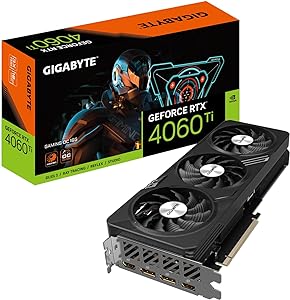GIGABYTE GeForce RTX 4060 Ti Gaming OC 16GB

The GIGABYTE GeForce RTX 4060 Ti Gaming OC features 16GB of GDDR6 memory and is equipped with 4352 cores for enhanced gaming performance. With a maximum resolution of 7680 x 4320, it supports high-definition visuals and offers multiple output options including DisplayPort and HDMI.
Popularity: Low
Performance:
Specifications:
Name GPU: GIGABYTE GeForce RTX 4060 Ti Gaming OC 16GB
Graphic Engine:
Cores: 4352
Core Clock: 2595 MHz
Vram: 16GB
Memory Clock: 18 Gbps
Memory Type: GDDR6
Memory Bus: 128 bit
Power Consumption: 160.0 W
Power Connectors: 8 pin*1
RGB: no
PCI Express: PCI-E 4.0
Max Resolution: 7680 x 4320
DirectX: 12 Ultimate
OpenGL: 4.6
Dimensions: L=281 W=117 H=53 mm
PCB Form: ATX
Output: DisplayPort 1.4a*2 HDMI 2.1a*2
Manufacturer Page: Link
Review
The GIGABYTE GeForce RTX 4060 Ti Gaming OC 16GB Graphics Card is a compelling addition to NVIDIA's mid-range lineup, designed to provide robust gaming performance with futuristic features. It boasts an impressive 16GB of GDDR6 memory, paired with 4352 CUDA cores, making it capable of exceeding enthusiast gamers' expectations. At a price of $777.00, it is poised in a competitive market segment shared with more powerful peers such as the RTX 4070, yet it comes with its unique appeal.
Performance and Architecture
Unveiling the technical prowess of the GIGABYTE GeForce RTX 4060 Ti Gaming OC 16GB, it is built on NVIDIA's AD106 graphics processor based on the Ada Lovelace architecture. This card emphasizes efficient performance with advancements in ray tracing, enabled by its 34 RT cores, and utilizes DLSS 3 Frame Generation to elevate FPS, especially in demanding titles (source: TechPowerUp).
Though aimed primarily at 1080p maxed-out settings, it also caters to 1440p gaming scenarios. However, for 1440p with ray tracing enabled, compromises in settings might be necessary to achieve the desired fluidity (source: TechPowerUp).
Performance Metrics and Market Positioning
According to David James from PC Gamer, the decision to double the VRAM to 16GB over the 8GB model does feel like a response to increasing VRAM demands from modern games—games that have shown limitations on 8GB configurations such as "The Last of Us" and "Jedi: Survivor" (source: PC Gamer). Nonetheless, this doesn't dramatically affect frame rates compared to the 8GB variant.
Benchmarks showcase minimal performance gains with the additional VRAM. At 1080p, the 16GB card registers only a 0% to 2% improvement in most games, with notable exceptions in select titles like "The Last of Us" which benefits from a 19% performance increase at 1440p (source: TechPowerUp).
Energy Efficiency and Cooling
The design of the GIGABYTE GeForce RTX 4060 Ti 16GB doesn't lag on frontend aesthetics. Though it draws slightly more power than its 8GB counterpart, overall energy efficiency remains commendable (source: TechPowerUp). Moreover, GIGABYTE's cooling solution with the WINDFORCE fans maintains optimal temperatures and low noise levels, aligning well with gaming rig expectations.
Value and Consideration
Critics argue that the premium price point, $100 higher than the 8GB version, is excessive given the marginal performance differences. For $777, alternatives like the RTX 3080 offer enhanced efficiency and value (source: TechPowerUp). Nonetheless, the additional memory capacity does potentially offer "future-proofing" against growing VRAM demands but is best appreciated by connoisseurs mindful of future software developments and preferences in ray tracing and DLSS-supported games.
Final Verdict
In conclusion, the GIGABYTE GeForce RTX 4060 Ti Gaming OC 16GB Graphics Card, wields Nvidia's advanced architecture with added VRAM, catering primarily to gamers seeking assurance in memory-hungry workflows and titles. However, value-driven consumers may ponder the cost justification amidst superior alternatives in the price vicinity. The card emerges as a strategic choice for those committed to balancing mid-tier gaming experiences with a nod to upcoming technological demands.